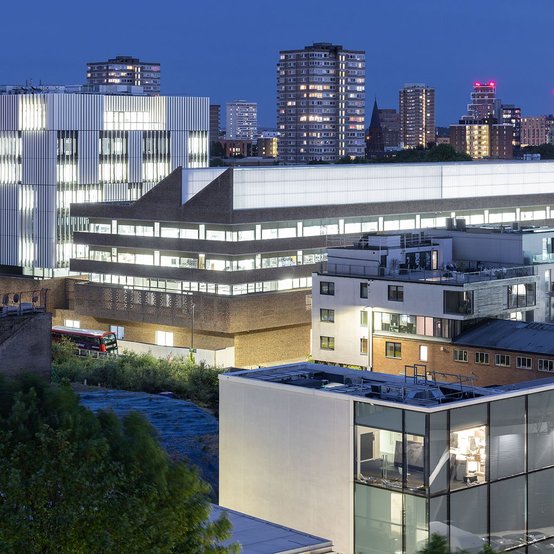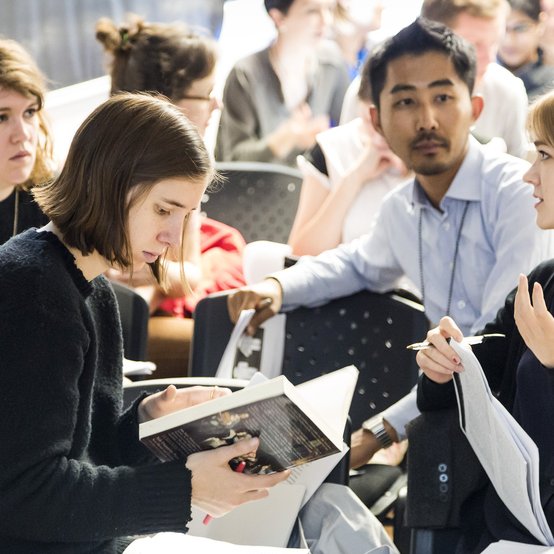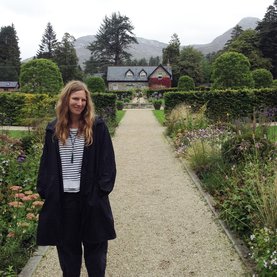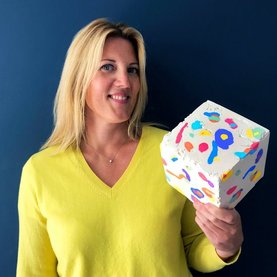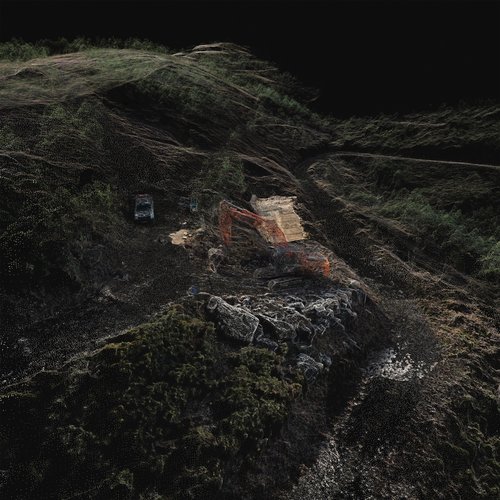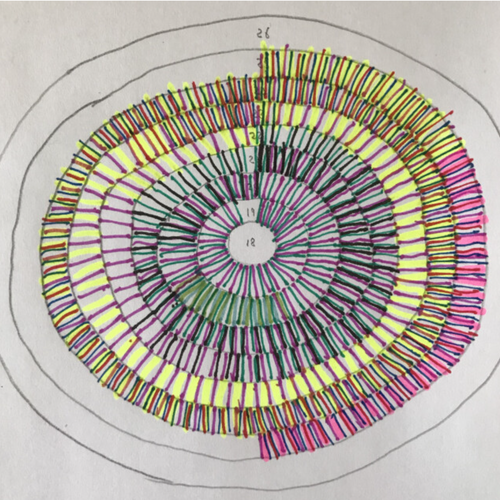
Overview
Innovate in creative education
Key details
- 180 credits
- 1 (FT) / 2 (PT) year programme
- Full-time or part-time study
School or Centre
Next open event
- 2 Feb 2026
- Join Online Portfolio Week
Next application deadline
- 17 Mar 2026
- Still accepting applications
Design and deliver creative education with a difference
- Become part of a community that connects people, ideas and disciplines
- Learn through experimentation where the process is as important as the product
- Study electives from across the College alongside your core creative education units
Eager to bring together your disciplinary and educational practice? Join us to learn how to design and deliver experimental education as part of a diverse community of creative people.
We’ve designed this course for professionals who want to explore the possibilities of education in a range of different formal and informal contexts.
Play and experiment
We bring students together as a community to explore different aspects of creative education. This involves themes such as curriculum design, the pedagogies of making, and education for change. We also encourage you to reflect on what you bring to the programme through your own values, perspectives and experiences.
This programme isn’t for those seeking to gain qualified teacher status (QTS) necessary to teach in primary, secondary and specialist schooling in the UK. This is not an accredited teaching qualification.
However, it does offer a unique opportunity for you to define and develop your educational practice through reflection, experimentation and collaboration.
Modes of delivery
The programme operates two modes of delivery:
- Blended learning, where you attend a regular pattern of scheduled teaching on-campus with occasional online delivery
- Online learning, where you attend a regular pattern of scheduled teaching that is delivered wholly online.
Kensington transformation
We are embarking upon a series of refurbishment works at our Kensington campus.
These involve making essential repairs to some areas of our much-loved heritage buildings and improving our facilities for future generations of RCA students and staff.
Find out more about the project.
Explore further and apply now
Catch the replays from our latest online Open Day.
Applications are now open for September 2026 entry. Round 2 application deadline: 17 March 2026, 12 noon (UK time). Apply now.
Stories
Gallery
Staff
Facilities
The RCA has facilities at Kensington, Battersea and White City.
View all College-wide facilitiesA significant part of the MEd course will be delivered online.
What you'll study
A significant part of the MEd course will be delivered online.
What you'll cover
Programme aims
The programme aims to:
- Provide you with the intellectual, technical and professional skills to review and renew your approach to creative education.
- Foster an experimental learning and teaching environment that enables you to make connections between different people, environments and ideas.
- Enable you to develop and realise an independent research project that translates your pedagogical principles into practice.
- Develop your confidence to identity and pursue opportunities that enhance your creative education practice and profile.
- Establish a diverse community of creative educators able to work collaboratively across disciplinary, sectoral and national boundaries.
Programme outcomes
By the end of the programme, you should be able to:
- Define your values as a creative educator in relation to competing critical, conceptual and policy perspectives.
- Critically evaluate your pedagogical strategies using the principles and methods of educational research.
- Demonstrate how to translate your pedagogical principles into the design and delivery of effective creative education.
- Critically reflect on the public impact of your practice as a creative educator, and on your responsibilities as a practitioner.
- Develop strategies for working with others across a range of diverse national and international learning environments.
- Communicate the aims, methods and outcomes of your creative education practice to a range of specialist and non-specialist audiences.
- Define your professional ambitions as a creative educator, and the actions required to met those ambitions.
Programme delivery
The programme will operate three principal modes of delivery:
- Burst-mode learning, where you attend campus for intensive weeks of study, followed by synchronous/asynchronous online learning. For example, a 15-credit unit will involve one week of on-campus study.
- Blended learning, where you attend a regular pattern of scheduled teaching throughout the unit that is delivered both online and on-campus.
- Online learning, where you attend a regular pattern of scheduled teaching throughout the unit that is delivered wholly online.
Programme structure: January 2026 entry
This information is subject to validation. Please note for January intake, the programme is is available on a full-time basis only.
Spring term
Foundations of Learning (15 credits). This unit explores the concepts and controversies of contemporary creative education. You will reflect on your experiences, knowledge and values, and locate your practice within a broader theoretical context.
Designs for Learning (15 credits). This unit gives you insight into and experience of designing inclusive creative education. It explores how to apply ideas in practice across a range of educational methods, modes and activities.
Making Pedagogies (15 credits) This unit explores the pedagogical implications and possibilities of an education based on making, including a consideration of the materials we use, the processes that we employ and the spaces that we inhabit.
Summer term
Experiments in Learning: proposal + project (15+15 credits). This unit enables you to review and renew your own creative education practice through the principles of action research.
Independent Research Project: Proposal (15 credits). This unit enables you to follow your curiosity by developing an ambitious proposal for an educational research project. For this part, you will develop a research proposal and associated ethics application that provides a rationale for your chosen project, and outlines how you intend to gather, analyse and present research data.
Autumn term
Independent Research Project (30 credits). This unit enables you to bring together learning throughout the programme on an ambitious research project that concludes your degree. For this part, you will conduct, analyse and present your chosen research project.
College-wide electives (2 x 15 credits).
Electives
You will be able to choose from a selection of College-wide electives. These will include one elective unit themed around creative education:
Education for Change: this unit supports you to design and deliver creative education that is focused on transformation. This will involve an exploration on how education can support people to navigate a complex, changing and unpredictable world.
Programme structure: September entry
Autumn term
Foundations of Learning (15 credits): this unit explores the concepts and controversies of contemporary creative education. You will reflect on your experiences, knowledge and values, and locate your practice within a broader theoretical context.
Experiments in Learning (proposal) (15 credits): this unit enables you to review and renew your own creative education practice through the principles of action research. You will develop a project plan and associated ethics application that provides a rationale for your chosen project, and outlines how you intend to gather, analyse and present research data.
Spring term
Designs for Learning (15 credits): this unit gives you insight into and experience of designing inclusive creative education. It explores how to apply ideas in practice across a range of educational methods and modes, including discussion of campus-based, blended and remote learning.
Experiments in Learning (project) (15 credits): this unit enables you to review and renew your creative education practice through the principles of action research. You will conduct, analyse and present your project, and reflect on how it informs your practice as a creative educator.
Summer term
Independent Research Project: Proposal and Project (60 credits)
Proposal: this unit enables you to bring together learning throughout the programme on an ambitious research project that concludes your degree. For this part, you will develop a research proposal and associated ethics application that provides a rationale for your chosen project, and outlines how you intend to gather, analyse and present research data.
Project: this unit enables you to bring together learning throughout the programme on an ambitious research project that concludes your degree. For this part, you will conduct, analyse and present your research project.
This MA is delivered over 45 weeks (full-time) and 90 weeks (part-time).
Electives
You will be able to choose from a selection of College-wide electives. These will include two elective units themed around creative education:
Education for Change (15 credits): this Term 1 unit supports you to design and deliver creative education that is focused on transformation. This will involve an exploration on how education can support people to navigate a complex, changing and unpredictable world.
Making Pedagogies (15 credits): this Term 2 unit explores the pedagogical implications and possibilities of an education based on making, including a consideration of the materials we use, the processes that we employ and the spaces that we inhabit.
Requirements
What you need to know before you apply
Candidates are selected entirely on merit and applications are welcomed from all over the world.
The MEd in Creative Education will be suitable for:
- Art and design educators in Higher Education, Further Education and other educational contexts
- People aspiring to be art and design educators in Higher Education, Further Education and other educational contexts
- Art and design practitioners with an interest in education and/or community engagement
- People involved in community engagement and/or organisation
- People involved in museum and/or gallery education
- Educational developers
Applicants are welcome from those have successfully completed undergraduate, graduate diploma or postgraduate degrees and have an active interest in and engagement with creative education.
We do not require MEd applicants to submit a portfolio as part of an application. We are more interested in interest and engagement with creative education than previous experience.
What's needed from you
Submission requirements
The application process involves two elements: a personal statement and a video.
The Personal statement should between 400 - 600 words. It should address the following prompts:
- What informs your approach to creative education?
- What educational themes and/or challenges do you want to explore during your studies?
- What initial ideas do you have for your own educational research project(s)?
- What training and/or support do you think you would need to realise your educational research project(s)?
- How do you think the programme will support your professional development goals?
The video should be no more than 2 minutes long and address the following prompts:
- What motivates you to keep learning?
- What do you look for in a learning community?
- What do you look for in a learning environment?
- What examples best demonstrate this?
English-language requirements
If you are not a national of a majority English-speaking country you will need the equivalent of an IELTS Academic or UKVI score of 6.5 overall (with a minimum of 5.5 in every component). Students achieving a grade of at least 6.0, with a grade of 5.5 in the Test of Written English, may be eligible to take the College’s English for Academic Purposes course to enable them to reach the required standard.
You are exempt from this requirement if you have received a 2.1 degree or above from a university in a majority English-speaking nation within the last five years.
If you need a Student Visa to study at the RCA, you will also need to meet the Home Office’s minimum requirements for entry clearance.
Fees & funding
For this programme
Fees for January 2026 entry
Fees for January 2026 entry on this programme are outlined below. From 2021 onward, EU students are classified as Overseas for tuition fee purposes.
Home (blended learning)
Overseas and EU (blended learning)
Fees for September 2026 entry
Fees for September 2026 entry on this programme are outlined below. From 2021 onward, EU students are classified as Overseas for tuition fee purposes.
Home (blended learning)
Home (online)
Overseas and EU (blended learning)
Overseas and EU (online)
Deposit
New entrants to the College will be required to pay a non-refundable deposit in order to secure their place. This will be offset against the tuition fees for the first year of study.
Home
Overseas and EU
Progression discounts
For students progressing to an MArch, MFA, MDes, MRes or MEd from an MA or MA/MSc, a progression fee discount of £2,000 is available (£1,000 per year for part-time study).
Scholarships
Scholarships
Each year, the RCA scholarship programme supports hundreds of students. The following scholarships are confirmed for this programme, with additional awards added throughout the year.
GREAT Scholarship
Eligible programmes: Interior Design MA, City Design MA, Environmental Architecture MA, Ceramics & Glass MA, Contemporary Art Practice MA, Curating Contemporary Art MA, V&A/RCA History of Design MA, Jewellery & Metal MA, Painting MA, Photography MA, Print MA, Sculpture MA, Writing MA, Animation MA, Digital Direction MA, Information Experience Design MA, Visual Communication MA, Design Products MA, Fashion MA, Intelligent Mobility MA, Service Design MA, Textiles MA, Creative Education MEd, Communication MFA, Master of Research RCA MRes, Design Futures MDes, Arts & Humanities MFA, Design Practice MArch
Other criteria: None
Eligible fee status: Overseas fee status
Value: £10,000 toward fees
RCA President & Vice-Chancellor’s International
Eligible programmes: Architecture MA Architecture (ARB/RIBA Part 2), Interior Design MA, City Design MA, Environmental Architecture MA, Ceramics & Glass MA, Contemporary Art Practice MA, Curating Contemporary Art MA, V&A/RCA History of Design MA, Jewellery & Metal MA, Painting MA, Photography MA, Print MA, Sculpture MA, Writing MA, Animation MA, Digital Direction MA, Information Experience Design MA, Visual Communication MA, Design Products MA, Fashion MA, Innovation Design Engineering MA/MSc, Intelligent Mobility MA, Service Design MA, Textiles MA, Creative Education MEd, Communication MFA, Master of Research RCA MRes, Design Futures MDes, Arts & Humanities MFA, Design Practice MArch
Other criteria: Applicants from Australia, Brazil, Canada, Chile, Colombia, Denmark, Egypt, France, Germany, Greece, Hong Kong, India, Indonesia, Israel, Italy, Japan, Malaysia, Mexico, Netherlands, Nigeria, Pakistan, Palestine, Poland, Portugal, Saudi Arabia, Singapore, South Korea, Spain, Switzerland, Taiwan, Thailand, Turkey, UAE, USA
Eligible fee status: Overseas fee status
Value: £9,000 toward fees
RCA President & Vice-Chancellor’s UK Scholarship
Eligible programmes: Architecture MA Architecture (ARB/RIBA Part 2), Interior Design MA, City Design MA, Environmental Architecture MA, Ceramics & Glass MA, Contemporary Art Practice MA, Curating Contemporary Art MA, V&A/RCA History of Design MA, Jewellery & Metal MA, Painting MA, Photography MA, Print MA, Sculpture MA, Writing MA, Animation MA, Digital Direction MA, Information Experience Design MA, Visual Communication MA, Design Products MA, Fashion MA, Innovation Design Engineering MA/MSc, Intelligent Mobility MA, Service Design MA, Textiles MA, Creative Education MEd, Communication MFA, Master of Research RCA MRes, Design Futures MDes, Arts & Humanities MFA, Design Practice MArch
Other criteria: None
Eligible fee status: Home fee status
Value: £5,000 toward fees
The RCA Sanctuary Scholarship
Eligible programmes: Interior Design MA, City Design MA, Environmental Architecture MA, Ceramics & Glass MA, Contemporary Art Practice MA, Curating Contemporary Art MA, V&A/RCA History of Design MA, Jewellery & Metal MA, Painting MA, Photography MA, Print MA, Sculpture MA, Writing MA, Animation MA, Digital Direction MA, Information Experience Design MA, Visual Communication MA, Design Products MA, Fashion MA, Intelligent Mobility MA, Service Design MA, Textiles MA, Creative Education MEd, Communication MFA, Master of Research RCA MRes, Design Futures MDes, Arts & Humanities MFA, Design Practice MArch
Other criteria: None
Eligible fee status: Home or overseas status
Value: Full fees & support package up to the value of £20,000 pa (depending on the awardee’s circumstances)
The Sir Frank Bowling Scholarship
Eligible programmes: Architecture MA Architecture (ARB/RIBA Part 2), Interior Design MA, City Design MA, Environmental Architecture MA, Ceramics & Glass MA, Contemporary Art Practice MA, Curating Contemporary Art MA, V&A/RCA History of Design MA, Jewellery & Metal MA, Painting MA, Photography MA, Print MA, Sculpture MA, Writing MA, Animation MA, Digital Direction MA, Information Experience Design MA, Visual Communication MA, Design Products MA, Fashion MA, Innovation Design Engineering MA/MSc, Intelligent Mobility MA, Service Design MA, Textiles MA, Creative Education MEd, Communication MFA, Master of Research RCA MRes, Design Futures MDes, Arts & Humanities MFA, Design Practice MArch
Other criteria: None
Eligible fee status: Home fee status
Value: Full fees and maintenance
Even if you do not currently see a scholarship for which you meet the eligibility criteria, we encourage you to apply to be considered for financial support.
Unless otherwise stated, you must apply in either round 1 or 2, and have received an offer of study on an RCA programme to be invited to make a scholarship application. Therefore, we strongly recommend you apply for your programme as early as possible but no later than the round 2 deadline.
More information
Additional fees
In addition to your programme fees, please be aware that you may incur other additional costs associated with your study during your time at RCA. Additional costs can include purchases and services (without limitation): costs related to the purchase of books, paints, textiles, wood, metal, plastics and/or other materials in connection with your programme, services related to the use of printing and photocopying, lasercutting, 3D printing and CNC. Costs related to attending compulsory field trips, joining student and sport societies, and your Convocation (graduation) ceremony.
If you wish to find out more about what type of additional costs you may incur while studying on your programme, please contact the Head of your Programme to discuss or ask at an online or in person Open Day.
We provide the RCASHOP online, and at our Kensington and Battersea Campuses – this is open to students and staff of the Royal College of Art only to provide paid for materials to support your studies.
We also provide support to our students who require financial assistance whilst studying, including a dedicated Materials Fund.
External funding
There are many funding sources, with some students securing scholarships and others saving money from working. It is impossible to list all the potential funding sources; however, the following information could be useful.
Experience
The social media content shown here reflects past and current student activity and is provided for illustrative purposes only. Experiences on the programme may vary and are subject to change for future students.
Start your application
Change your life and be here in 2026. Applications now open.
The Royal College of Art welcomes applicants from all over the world.
Before you begin
Make sure you've read and understood the application process and deadlines.
Application key datesCheck you the programme-specific entrance and portfolio requirements on the programme page.
Consider attending an Open Event, either online or in person, or watch recordings of previous events.
See upcoming events and recordingsPlease note, all applications must be submitted by 12 noon on the given deadline.
Ask a question
Get in touch if you’d like to find out more or have any questions.


